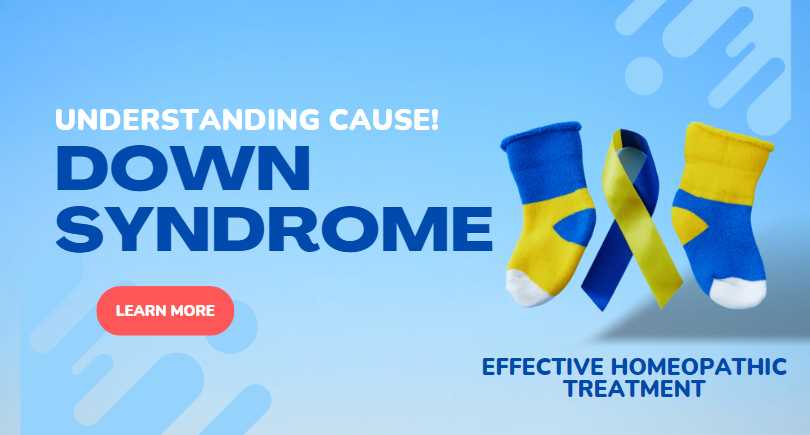Decoding the cause of Down Syndrome
Down syndrome, a genetic condition resulting from an error in cell division during meiosis, is characterized by the presence of an extra copy of chromosome 21. While there is no cure for Down syndrome, homeopathy offers a personalized and holistic approach to treatment of Down syndrome. By understanding the main cause and addressing specific concerns, homeopathy can significantly improve the quality of life for individuals with Down syndrome.
Understanding the Main Cause: Meiosis and Chromosomal Error
Meiosis is the division of reproductive cells (sperm and egg cells) that occurs before fertilization takes place. During meiosis, chromosomes are supposed to separate correctly, ensuring that each resulting cell receives the correct number of chromosomes. However, in Down syndrome, an error called nondisjunction occurs, leading to an abnormal distribution of chromosomes in the resulting cells. In most cases of Down syndrome, the error of nondisjunction occurs during meiosis I, specifically in the ovum (egg cell) or, less commonly, in the sperm.
To understand the timing of the error, let’s focus on meiosis phase I.
Meiosis I
In females, meiosis begins during fetal development but halts in a specific phase called prophase I and remains paused until puberty.
At puberty, meiosis resumes, and the process continues throughout the reproductive years in a cyclical manner.
During each menstrual cycle, a group of immature egg cells called primary oocytes start to grow and mature within the ovaries. These primary oocytes are encased in fluid-filled structures called ovarian follicles. However, only one dominant follicle is selected to continue its development and reach maturity.
Under the influence of follicle-stimulating hormone (FSH) released by the pituitary gland, the selected dominant follicle grows and completes the first stage of meiosis, known as meiosis I, just prior to ovulation. The exact day can vary among individuals, depending on the length and regularity of the menstrual cycle, but on average, the primary oocyte begins to develop around day 6 to day 14 of the menstrual cycle.
Meiosis I, the first stage of meiosis, completes in the ovum just prior to ovulation.
At the end of meiosis I, the primary oocyte divides into two unequal parts: a secondary oocyte, which contains most of the cytoplasm, and the first polar body, a smaller cell with minimal cytoplasm. The secondary oocyte proceeds to meiosis II but remains arrested in metaphase II until fertilization occurs.
If fertilization occurs, the secondary oocyte completes meiosis II, resulting in the release of a mature ovum and a second polar body. If fertilization does not occur, the secondary oocyte degenerates without completing meiosis II.
It is important to note that problems specifically in meiosis II do not typically cause Down syndrome. Down syndrome, also known as Trisomy 21, is primarily caused by an error that occurs during meiosis I. During meiosis I, the homologous chromosomes fail to separate properly, resulting in an extra copy of chromosome 21 being present in the resulting egg or sperm cell. When fertilization occurs with a normal gamete (egg or sperm), the resulting zygote will have three copies of chromosome 21 instead of the usual two.
Homeopathic Approach to Down Syndrome
In the context of Down syndrome, a genetic disorder characterized by the presence of an extra copy of chromosome 21, homeopathy offers a unique and individualized approach to treatment. Homeopathy aims to stimulate the body’s innate healing capacity and restore balance on physical, mental, and emotional levels.
To effectively address Down syndrome using homeopathy, it is crucial to identify the precise cause of the condition. This involves thorough investigation and understanding of factors that occurred during the 6th to 14th day of the mother’s menstrual cycle, which is the critical window for the development of the ovum. By examining the date of the mother’s last menstrual cycle and delving into her emotional and physical experiences during this timeframe, the best homeopathic doctor can gain valuable insights into potential triggers and contributing factors.
Emotional stressors, such as anger, grief, fear, and jealousy, can play a significant role in disrupting the delicate balance of the developing fetus. A Homeopath take into account these emotional factors and tailor the treatment accordingly. Additionally, any physical factors such as exposure to drugs or toxins during the critical period are thoroughly assessed to ensure a comprehensive understanding of the case.
Once the cause of Down syndrome is identified, A homeopath prescribe individualized remedies that matches the cause of Down syndrome and the other unique symptoms and characteristics of the Child. These remedies are selected based on the principle of “like cures like,” where substances that can produce similar symptoms in a healthy person are used to stimulate the body’s healing response.
Homeopathy also aims to address the specific concerns associated with Down syndrome, such as mental retardation, lowered immunity, delayed milestones, and gastric complaints. Through the use of carefully selected homeopathic remedies, individuals with Down syndrome can experience improvements in their cognitive abilities, immune function, motor development, and gastrointestinal health.
It is important to note that homeopathy does not claim to provide a cure for Down syndrome itself, as it is a genetic condition. However, by effectively managing and alleviating the associated symptoms, homeopathy can significantly enhance the quality of life for individuals with Down syndrome.
Conclusion
In conclusion, homeopathy offers a personalized and holistic approach to the treatment of Down syndrome. By identifying the precise cause and selecting individualized remedies, homeopaths aim to stimulate the body’s inherent healing mechanisms and promote overall well-being. While homeopathy cannot cure Down syndrome, it can contribute to improving various aspects of the individual’s health and enhancing their overall quality of life.
Read the research study on down syndrome done at HomoeoCARE

